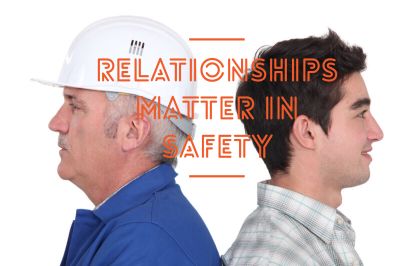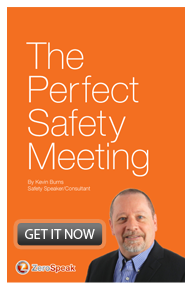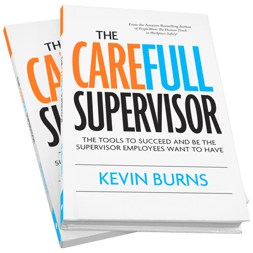Relationships work better when there is respect and trust - both ways.
 As a supervisor or safety person, building better relationships is key to open communication. It is also the strongest building block to creating engaged teams that buy-in to safety. Combine good communication with mutual trust and respect and you build solid teamwork. Relationships matter and so you had better get good at them. But you cannot feign or fake your way to building solid working relationships.
As a supervisor or safety person, building better relationships is key to open communication. It is also the strongest building block to creating engaged teams that buy-in to safety. Combine good communication with mutual trust and respect and you build solid teamwork. Relationships matter and so you had better get good at them. But you cannot feign or fake your way to building solid working relationships.
It has been proven that employees leave a company largely due to the relationship with supervisors. In this case, that also includes safety people. A poor relationship with a supervisor or safety person can hinder safety efforts and willingness to embrace the safety program.
Here are five ways you can begin to build better relationships immediately:
1You can be right, or you can be happy. But you can’t be both. To become a more effective supervisor, let go of the need to be right. You may be thinking right now, “but I’m really happy when I’m right.” When you hold on to the need to be right, by default, you’re making someone else wrong. For employees, that’s a tough environment to work in when the employees are made wrong. It creates disengagement from the work and impacts loyalty to the company negatively. Instead, find ways to make your crew members right. Find ways to elevate their ideas and suggestions. Give them the opportunity to shine. Demonstrate to them that you value their ideas and their contributions and they will give you respect and trust you as an adviser.
2Be the same person both on and off the job. You’re not an actor. It’s not a role in community theatre. You have to bring your authentic self to the job. If you can care about family, you can care about your employees. If you can have empathy when your child skins their knee, you can have empathy for a crew member going through a difficult time. The litmus test is to ask yourself if you would impress or scare your own child with how you conduct yourself among your fellow workers? Could you bring your child to work with you one day and be proud of how you interact with employees? Be the same person you are when you’re with your loved ones, and you will never feel the need to make excuses for your behavior.
3Treat your position as a career. Professional athletes don’t show up to a game hoping to be able to “wing it” to victory. They spend thousands of hours practicing and fine tuning their performance. They work with performance coaches and sport psychologists. They find ways to incorporate new ideas and strategies into their performance. That’s why the best athletes get the highest pay. And you? Can you recall the title of the last book you read? If you want to be an exceptional supervisor or safety person, you need to hone your craft too. You need to create space on your daily calendar for (practice) development. If you are not going to get any better, your crew is not going to get any better.
4Don’t suck up the oxygen. There is no need to prove that you’re in charge nor is there any need to dominate the conversations. If you suck up all of the oxygen, there is no oxygen left for the team. If there is no oxygen, the team dies. Allow your crews to share the air. Allow your crews to ask, comment and offer up ideas and suggestions. Create an environment that allows them to breathe life into the team. This is particularly useful in toolbox and tailgate meetings. When you give long-winded speeches, the only thing you’re achieving is sucking up the air. Your people aren’t going to take away anything useful. You’ve taken away the oxygen. They feel choked-out by the information dump. Make employees the real stars. You should influence conversations, not dominate them.
5Engage. Employees engage in safety in direct proportion to the level of their supervisor’s engagement. If you are not actively engaged in your work, there is little chance that employees will be giving an engaged effort either. Employees take their cues from their supervisors. If you want their engagement, you must first give them yours. Without engagement, you’re just trying to get employees to follow the rules, but without any meaningful buy-in.
 Relationships work better when there is respect and trust - both ways. To create trusting and respectful relationships, first change what you can control; yourself. All subsequent changes in others come from the example you set.
Relationships work better when there is respect and trust - both ways. To create trusting and respectful relationships, first change what you can control; yourself. All subsequent changes in others come from the example you set.
Kevin Burns gives engaging, entertaining and inspiring speeches to front-line employees at safety meetings. He also works with supervisors and safety managers on-site or in keynote presentations at conferences. Kevin helps organizations integrate caring for and valuing employees through their safety programs. Kevin Burns is a management consultant, safety speaker and author of 9 books.He is based in Calgary, Canada.
©2016 ZeroSpeak Corporation and Kevin Burns.
No part of this post may be reproduced without the expressed consent of the author.


